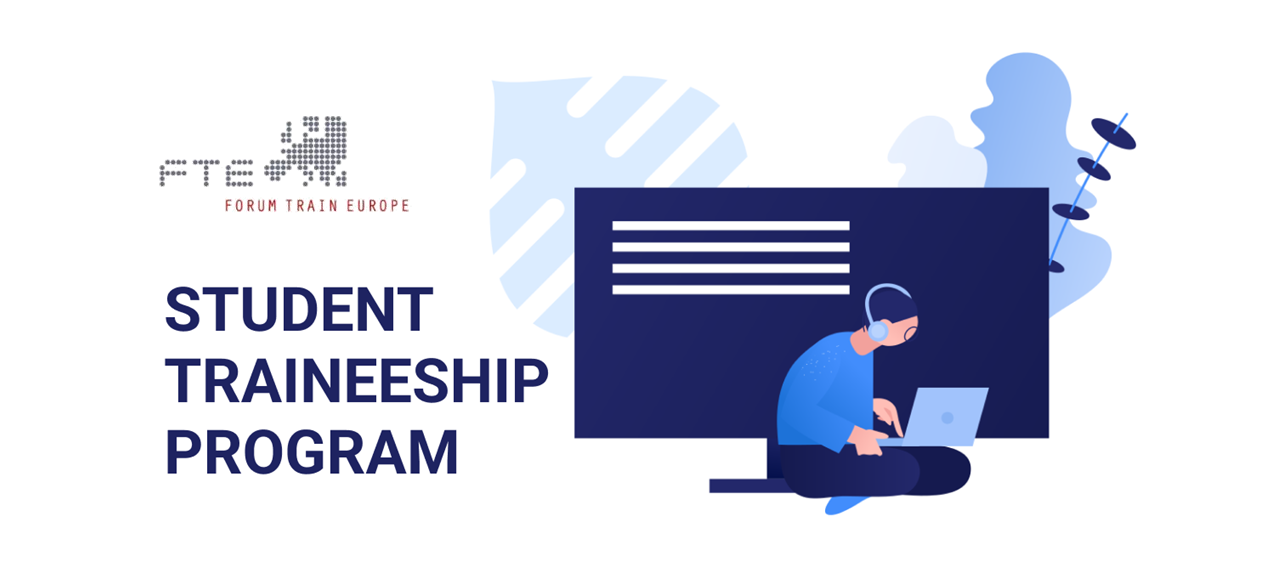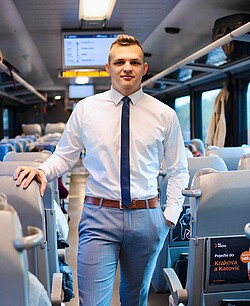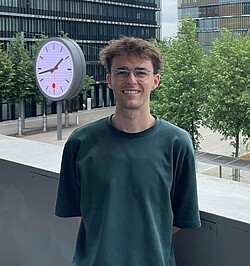Boost your Railway Career!

,Are you a highly motivated university student or a recent graduate with a passion for railways? If so, FTE offers an exciting opportunity to become part of our team through our student traineeship program. During the traineeship, you will work on real projects actively contributing to our organisation’s daily operations. This hands-on experience will not only enhance your soft skills but also provide a solid foundation in the railway business. Therefore, the traineeship is very suitable for a person with a passion for railways and high motivation to pursue a career within the railway sector, for instance, to work for one of the FTE members. Furthermore, since 2025, FTE and ČD Cargo started to offer a very unique opportunity to experience the work at an international association and a freight operator already at the starting level.
Read more about:
FTE Past Trainees
We take pride in the talented individuals who have joined our association, and the fact that we were the stepping stones for them to launch a successful railway career. You could be the next success story! Take a look at some of our past trainees and read their interviews to learn more about their experiences:

Jan Renc
With us in 2022
As of 2023:
Fianancial/Business Development Analyst at
Leo Express

Thomas Raney
With us in 2022-2023
As of 2023:
Capacity Management Process & IT Back Office at
RailNetEurope

Giuseppe Miccoli
With us in 2023
As of 2024:
Technical Cooridinator at
EIM European Rail Infrastructure Managers

Combined ČD Cargo - FTE Traineeship
We invite a university student/graduate to experience a unique journey for several months and by this boost her/his career. We aim to pass you invaluable insights and hands-on experience from both an international association and a freight operator, making it a very unique choice for a traineeship in Europe.
- At ČD Cargo, you will learn about the daily business aspects of rail freight transport and support the staff in operation tasks.
- At Forum Train Europe, you will get an understanding of the bigger picture of railways, working on strategic projects aimed at improving the railway transport landscape in Europe.
This is an ongoing call, which means you can apply for the traineeship at any time of the year. Note that no response might be provided to an incomplete dossier. Your complete dossier will be evaluated, and we will reach out to discuss if your skills align with our team’s needs during the suggested period of the traineeship. Before applying, please read carefully the detailed information provided in the documents below:
ČD Cargo-FTE Student-Graduate Traineeship Offer Description v1.0
ČD Cargo-FTE Traineeship Call for Trainees v1.0
Update on traineeship capacity limit: possible to apply with a start date in 2025.
FTE Traineeship Programe
Under the traineeship program, FTE offers students and graduates a unique opportunity to experience work at an international association right from the start. We believe that an early understanding and analysis of the bigger picture of railways (within the scope of FTE activities) benefits the trainee before they start a job with specific tasks. This knowledge might help them later better understand the motivations of various stakeholders and the context of challenges to be overcome.
At FTE, we take the involvement of trainees in our work very seriously, and we strive to guide them with passion, respect, and motivation toward their future careers. We establish a regular dialogue and listen to their interests and skills so that we can involve them in a constructive, challenging, and engaging way.
Depending on your profile, you can look forward to:
- Joining 1-2 projects as a project team member, working under supervision and independently
- Engaging in meaningful tasks that contribute to the development of European standardisation and future capacity management processes and systems,
- Developing and refining your soft skills in an international business environment, interacting with representatives of Railway Undertakings and other stakeholders,
- Opportunities for business trips throughout Europe (on board of a train, even on long distances 😊).
Our philosophy is that the traineeship should be a win-win opportunity. While you gain interesting and valuable experience, FTE members benefit from a motivated person with a fresh perspective who actively contributes to their activities and interests.
Currently, the sector is experiencing an increasing shortage of highly qualified staff. At FTE, we would like to help you find your way into our sector. You should not expect to stay at FTE afterward, but we would be very pleased if you successfully apply for a job with one of our members or within the railway system.
Candidates profile
Are you interested in starting your journey with FTE? Would you like to find out if you would fit in? Doing the traineeship with us requires availability for 4-5 days per week over a few months.
We are seeking candidates who possess:
- High motivation and passion for railways
- Fluency in English (B2+; note that although FTE is based in Switzerland, no knowledge of German and French is required
- Proficiency in MS Office
- A general understanding of FTE mission and ongoing activities
We consider it a plus when if you have:
- Outstanding language skills in another EU language (e.g. PL, HU, SI, HR, DE)
- Interest in one of the following topics:
- Railway timetabling and capacity planning
- Rail infrastructure charges
- Logistics and intermodal transport
- Allocation and train priority criteria
- Communication and design
If you are unsure about combining the traineeship with your academic responsibilities, don’t worry. We believe in equal opportunities and are open to flexible working arrangements that suit your needs. We can accommodate flexible working days and hours, and in some cases, we may agree on a hybrid model considering your financial situation. This means you can spend selected weeks in Switzerland and selected weeks on business trips within Europe.
Before applying, we recommend carefully reading the detailed information provided in the call here.
This is an ongoing call, which means you can apply for the traineeship at any time of the year. Please note that incomplete applications may not receive a response. Complete dossiers will be evaluated, and we will reach out if your skills align with our team’s needs during the suggested traineeship period.
Update on traineeship capacity limit: Applications are now possible only with a start date in 2026.
Thesis Opportunities
For master’s and PhD students, we offer the chance to contribute to the development of future European railway processes by completing a thesis or research on a selected topic from our working program. The conducted work can be of high relevance for Railway Undertakings, providing empirical evidence for business improvement and thus contributing to higher competitiveness of rail.
To apply for an offered thesis topic, please contact us at info@forumtraineurope.eu and include your CV and a clear motivation statement. Upon mutual agreement, the FTE office can offer an introduction to the topic and may invite you to the relevant international meetings. Nonetheless, the majority of the work should be carried out independently, including data collection. Please note that currently the thesis may only be combined with a traineeship at FTE.
The currently open topics are:
Integration of service facilities into the capacity management process
The associations for Railway Undertakings and Infrastructure Managers FTE/RNE are currently in the implementation of the future TTR process, which focuses on railway capacity planning and railway allocation. Nevertheless, for RU business it is essential to have the right to use the tracks but also to have a reserved slot at the terminal/service facility. These two separate processes are currently integrated only to a limited extent, which shall change. The suggested research should map the current processes for selected service facility types (potentially including the gap analysis) in several selected countries, investigate the market needs of the sector (i.e., best practices in Europe), and finally, propose recommendations (process) on how to integrate service facilities to harmonised integrated capacity/slot allocation, but also the long-term strategical railway planning. The research methodology will be determined through mutual agreement, but it would certainly require at least independent desk research and potentially interviews with the involved stakeholders. The suggestion is to select service facilities from freight terminals, passenger stations, cleaning and washing facilities, and refuelling facilities. Please check the Service Facilities project page, especially the published reports to have better understanding of the output which you would be asked to produce under supervision.
This topic is currently open for application from February 2026.